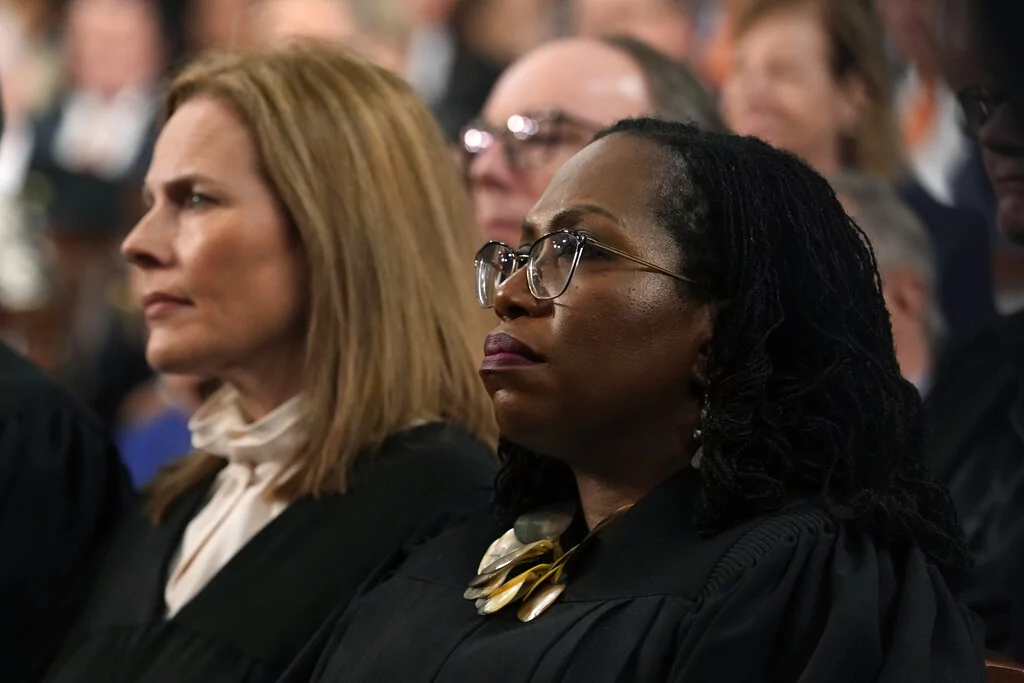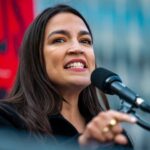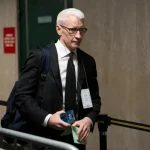
Justices Amy Coney Barrett and Ketanji Brown Jackson split from their respective conservative and liberal alignments Friday in a case that narrowed an obstruction charge used to prosecute defendants from the Jan. 6, 2021, Capitol riot.
The Supreme Court split 6-3 in a ruling that sided with Joseph Fischer, a former police officer who was accused of participating in the riot and who challenged the statute, Section 1512(c)(2), as being improperly applied to his case and scores of other rioters. The court concluded that the law was only intended to apply to more limited contexts involving forms of evidence tampering and not so much the broader array of circumstances that Department of Justice prosecutors said it covered.

There were two other rulings released Friday where the justices split 6-3 along ideological lines between the high court’s six conservative justices and three liberals. However, Fischer v. United States saw Barrett, an appointee of former President Donald Trump, and President Joe Biden‘s nominee, Jackson, invert their typical alignments, with Barrett joining the liberals and Jackson with the five other conservatives.
“Joseph Fischer allegedly participated in a riot at the Capitol that forced the delay of Congress’s joint session on Jan. 6,” Barrett wrote in a dissent to the majority decision by Chief Justice John Roberts. “Blocking an official proceeding from moving forward surely qualifies as obstructing or impeding the proceeding by means other than document destruction. Fischer’s alleged conduct thus falls within (c)(2)’s scope.”
The Supreme Court, as of Friday, has only decided nine decisions along complete ideological lines this term, and only technically has four cases left to decide. That is significant in part because it means that the current term’s partisan divides cannot possibly match the 2021-22 term, where the justices then decided 14 cases total along ideological lines.
Morgan Marietta, dean of economics, politics, and history at the University of Austin, told the Washington Examiner the split in Fischer was not surprising given that Jackson and Barrett come from very different backgrounds with clashing jurisprudence. He compared Jackson to conservative Justice Neil Gorsuch, an appointee of Trump who often sides with the liberals in Native American cases and other disputes over due process.
“In her confirmation hearing, [Jackson] was criticized for her view that criminal punishments should not be stretched for disfavored defendants in cases of child pornography,” Marietta said, adding that Jackson believes criminal charges should not be distorted for “disfavored” defendants such as those from the Capitol riot.
While Jackson did join the majority, she wrote a separate concurrence that condemned the actions of rioters at the Capitol that day, saying those who “attempted to disrupt it in this way inflicted a deep wound on this Nation.”
“In a time when rule of law is being twisted and visible facts misrepresented, the Fischer ruling is extremely important, especially because it is supported by one of the liberal Justices,” Marietta said.
Both Marietta and Walter Olson, Cato Institute senior fellow, emphasized that the ruling in Fischer does not absolve defendants from the riot, given that numerous defendants face other charges from conduct that day unrelated to the 1512(c)(2) charge.
“A confusingly drafted clause in the 2002 Sarbanes-Oxley financial reform law had left it unclear how broadly that law banned the obstruction of a federal proceeding,” said Olson.
He added that the majority “left the provision intact but read it as applying only to the obstruction of documents, records, and similar things used in proceedings.”
Barrett defended her retreat from the pack in a dissent that was charitable to Congress, noting that lawmakers likely were not thinking about the possibility of a riot at the Capitol at the time lawmakers wrote the statute.
“Who could blame Congress for that failure of imagination?” she asked rhetorically.
Among those charged under the provision were several members of the Proud Boys and Oath Keepers groups, including Enrique Tarrio and Stewart Rhodes, leaders of those fringe groups, respectively.
Two of four charges in Trump’s federal 2020 election subversion case also involve the same statute. That case has been paused for months, but the Supreme Court could decide as soon as Monday on the major question of whether he enjoys any immunity from prosecution in the case.
Despite the victory for Fischer and clarification about the scope of the obstruction statute, the road may still be a long one for Trump and defendants who turned out for his rally-turned-protest in January 2021.
Special counsel Jack Smith will have to now prove in Trump’s case that “Trump impaired, attempted to impair, or conspired with others to impair the availability or integrity of documentary or testimonial evidence used in an official proceeding,” according to John Malcolm, director of the Meese Center for Legal and Judicial Studies at the Heritage Foundation.
“This is significant because … approximately 350 other Jan. 6 defendants have been charged with violating this provision, and Count Three of the four-count indictment against Trump alleges a violation of this code section,” Malcolm added.
CLICK HERE TO READ MORE FROM THE WASHINGTON EXAMINER
Malcolm told the Washington Examiner that the full picture of how the Fischer decision may apply to Trump’s 2020 election case may not even be clear until the high court rules on immunity, which some legal experts expect to establish a test to determine when a president’s conduct is considered public or private.
“Regardless of whether [Smith] can make that showing, which seems doubtful, additional court proceedings over whether Smith can even continue prosecuting Trump under these code sections will likely ensure that this case against Trump will not reach a trial before the election,” Malcolm wrote for the Daily Signal.




